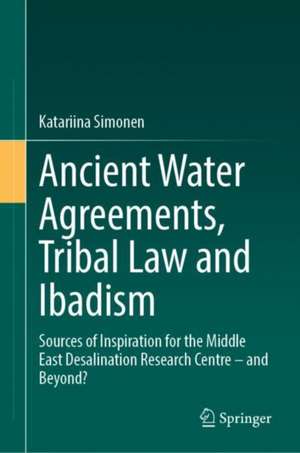Ancient Water Agreements, Tribal Law and Ibadism: Sources of Inspiration for the Middle East Desalination Research Centre – and Beyond?
Autor Katariina Simonenen Limba Engleză Hardback – 20 oct 2021
In Oman, a historical seafaring nation on the south-eastern corner of the Arabian Peninsula, a culture of agreement that accommodates the interests of everyone has developed around the division of scarce water resources.
Life in the arid inland of the Omani Hajar mountains would not have been possible without water. Irrigation channel (falaj) construction is extremely old and skilful therein. Local practices evolved around the division of water and land on the basis of fairness. The community would be best served by inclusion and the avoidance of conflict.
A specific Islamic school called Ibadi arrived at Oman early on in the eighth century. Ibadi scholars conserved local practices. Consultation and mediation by sheikhs and the religiousleader, Imam, became the law of the land. The Omanis were known as the People of Consultation, Ahl Al Shura.
In time, the practice of inclusive agreements would extend far beyond the village level, affecting Oman´s foreign policy under Sultan Qaboos. Oman´s water diplomacy succeeded in uniting the contestants of the Middle East Peace Process in the 1990s to work together on common problems of water desalination.
| Toate formatele și edițiile | Preț | Express |
|---|---|---|
| Paperback (1) | 722.26 lei 6-8 săpt. | |
| Springer International Publishing – 21 oct 2022 | 722.26 lei 6-8 săpt. | |
| Hardback (1) | 728.28 lei 6-8 săpt. | |
| Springer International Publishing – 20 oct 2021 | 728.28 lei 6-8 săpt. |
Preț: 728.28 lei
Preț vechi: 888.14 lei
-18% Nou
Puncte Express: 1092
Preț estimativ în valută:
139.38€ • 144.97$ • 115.06£
139.38€ • 144.97$ • 115.06£
Carte tipărită la comandă
Livrare economică 14-28 aprilie
Preluare comenzi: 021 569.72.76
Specificații
ISBN-13: 9783030852177
ISBN-10: 3030852172
Ilustrații: IX, 191 p. 8 illus., 7 illus. in color.
Dimensiuni: 155 x 235 mm
Greutate: 0.46 kg
Ediția:1st ed. 2021
Editura: Springer International Publishing
Colecția Springer
Locul publicării:Cham, Switzerland
ISBN-10: 3030852172
Ilustrații: IX, 191 p. 8 illus., 7 illus. in color.
Dimensiuni: 155 x 235 mm
Greutate: 0.46 kg
Ediția:1st ed. 2021
Editura: Springer International Publishing
Colecția Springer
Locul publicării:Cham, Switzerland
Cuprins
Introduction.- Historical Landscapes.- Ibadi Islam and the Imamate Tradition.- Falaj and Agreement.- Tribalism and Local Agreement.- Oman Water Diplomacy Part I: The Beginnings of the Middle East Desalination Research Centre (MEDRC).- Oman Water Diplomacy Part II: The Establishment of the Middle East Desalination Research Centre (MEDRC).- Epilogue.- Selected Bibliography.- Index.
Notă biografică
Katariina Simonen holds a LLD degree in public international law from the University of Turku. She is currently a postdoctoral research fellow at the Department of World Cultures, University of Helsinki, and adjunct professor at the National Defence University. She is also Council Member of Nobel Laureate (1995) Pugwash Conferences on Science and World Affairs. Her research interests focus on Iran nuclear negotiations, international security, sanctions and arms control. In addition to her academic career, she has held various government positions in the Finnish Government, European Union and NATO.
Textul de pe ultima copertă
This book traces the development of Oman's inclusive agreements and highlights their importance for international negotiations, dealing with issues most relevant to humanity's own survival today, nuclear weapons or climate change.
In Oman, a historical seafaring nation on the south-eastern corner of the Arabian Peninsula, a culture of agreement that accommodates the interests of everyone has developed around the division of scarce water resources.
Life in the arid inland of the Omani Hajar mountains would not have been possible without water. Irrigation channel (falaj) construction is extremely old and skilful therein. Local practices evolved around the division of water and land on the basis of fairness. The community would be best served by inclusion and the avoidance of conflict.
A specific Islamic school called Ibadi arrived at Oman early on in the eighth century. Ibadi scholars conserved local practices. Consultation and mediation by sheikhs and the religious leader, Imam, became the law of the land. The Omanis were known as the People of Consultation, Ahl Al Shura.
In Oman, a historical seafaring nation on the south-eastern corner of the Arabian Peninsula, a culture of agreement that accommodates the interests of everyone has developed around the division of scarce water resources.
Life in the arid inland of the Omani Hajar mountains would not have been possible without water. Irrigation channel (falaj) construction is extremely old and skilful therein. Local practices evolved around the division of water and land on the basis of fairness. The community would be best served by inclusion and the avoidance of conflict.
A specific Islamic school called Ibadi arrived at Oman early on in the eighth century. Ibadi scholars conserved local practices. Consultation and mediation by sheikhs and the religious leader, Imam, became the law of the land. The Omanis were known as the People of Consultation, Ahl Al Shura.
In time, the practice of inclusive agreements would extend far beyond the village level, affecting Oman´s foreign policy under Sultan Qaboos. Oman´s water diplomacy succeeded in uniting the contestants of the Middle East Peace Process in the 1990s to work together on common problems of water desalination.
Caracteristici
Takes a multidisciplinary approach spanning legal history, Islamic law, political history and anthropology Provides valuable guidance for conflict resolution in the Middle East Timely account of historical Oman at the end of the Qaboos era
